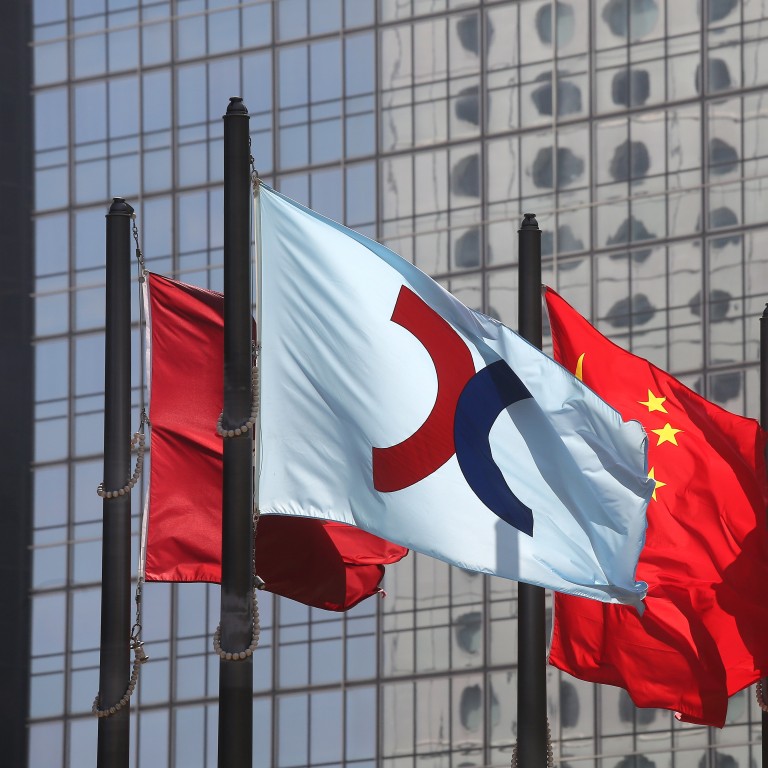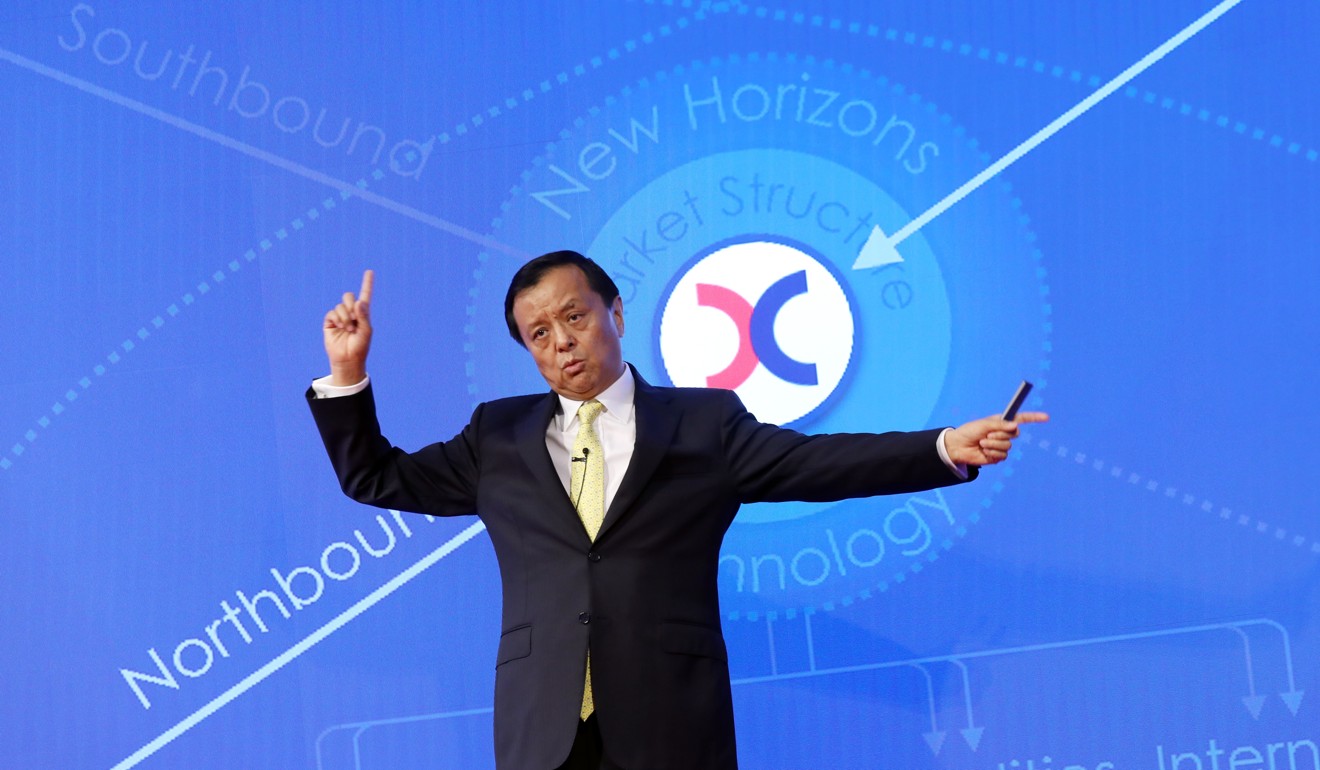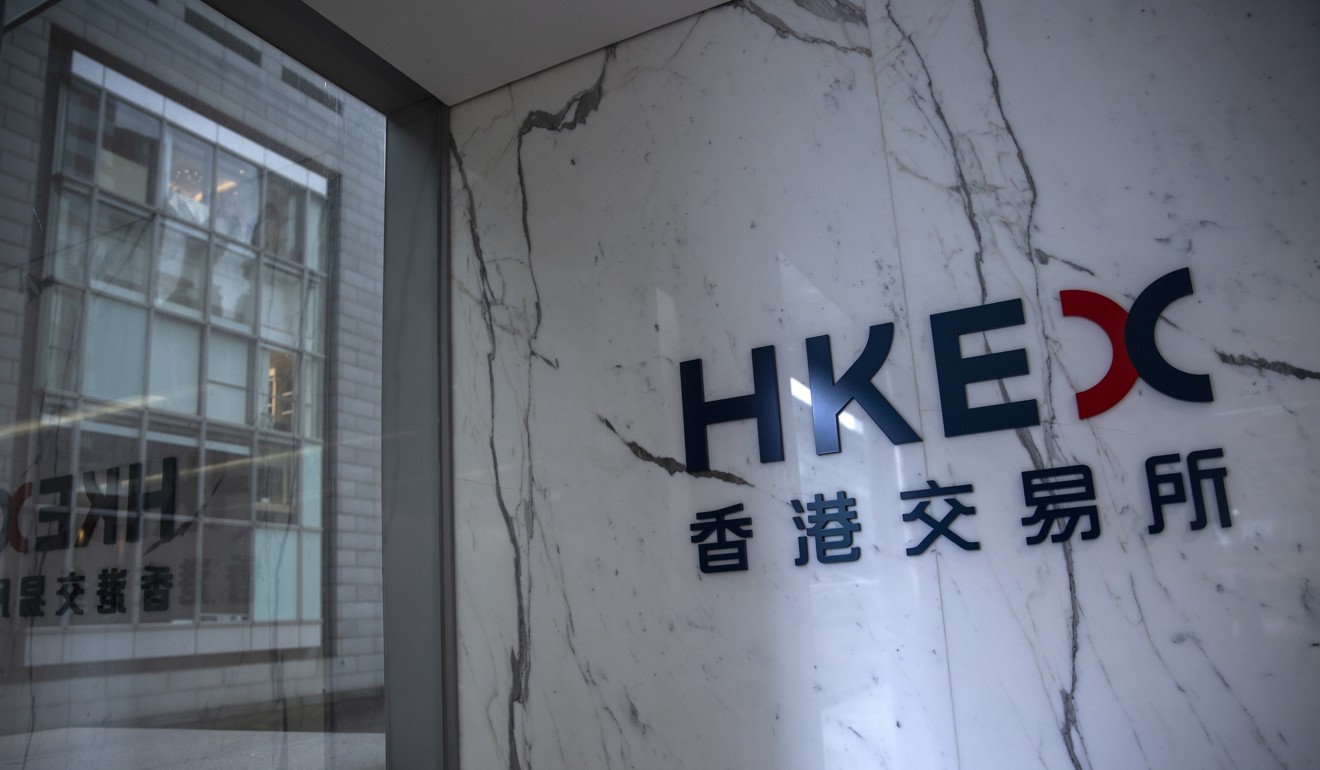
Hong Kong Exchanges and Clearing aims to be the go-to giant for investment in Asia time zone in three-year plan
- City’s exchange operator will bolster role as gateway for investment in and out of mainland China
- Will woo Asia-Pacific companies to list in city as it competes with rival stock exchanges in US and mainland China
The operator of the Hong Kong stock exchange, Asia’s third largest market, on Thursday unveiled a three-year plan to become the world’s go-to market during Asian trading hours by wooing top Asia-Pacific companies to list in the city while bolstering its gateway role for mainland China investment.
Charles Li Xiaojia, chief executive of Hong Kong Exchanges and Clearing, said Hong Kong will become a hub for Asia-Pacific and other companies in the world to list.
He also wants to shorten the length of time it takes for initial public offerings. Currently, trading starts five days after the pricing and settlement of the IPO. New York and London have a quicker process.
“Hong Kong has a lot of listing companies and investment products but they are now mainly Hong Kong and mainland Chinese companies,” Li wrote on his blog.
“While Asia-Pacific economies are developing rapidly, the global investors have great interest in investing in the Asia-Pacific region. But now there are not enough products to meet these demands. HKEX needs to capture these opportunities by attracting more Asia-Pacific companies and ETFs to list here,” he added, referring to exchange traded funds, which are funds that trade like stocks.

Li later told a media briefing that to achieve this goal that it would lobby Beijing to expand the stock connect schemes to allow mainlanders to buy into these international stocks after listing in Hong Kong and also during the IPO.
To begin with, the stock connect scheme will be expanded in July to allow mainlanders to trade dual-class shareholding companies like smartphone maker Xiaomi and food delivery company Meituan-Dianping.
Li said that he also wants to see the southbound connect to be expanded to allow mainlanders to trade currencies, bonds, ETFs and other commodity products on the HKEX in the future.
Hong Kong regains global IPO crown from New York in 2018 thanks to its listing reforms
The HKEX also plans to work with the Securities and Futures Commission – Hong Kong’s market watchdog – to allow Asian brokers to remotely access the exchange without licences here.
“We need to have brokers who know these Asia-Pacific companies well to trade these firms. It will therefore be ideal to allow these Asian brokers to have remote access to the local market,” Li said.
The Securities and Futures Commission, which licenses brokers in Hong Kong, said that it was “looking forward to working with the HKEX as it implements its new strategic plan”.
Edward Au, co-leader of national public offering group at Deloitte China, said the HKEX would be able to attract Asian companies to raise funds as it has liquidity.

“Hong Kong stock market is the most liquid market in Asia after Japan. The stock markets of Singapore and Malaysia do not have liquidity like Hong Kong. Southeast Asian companies will like to list here. Rather, Hong Kong will find it hard to attract companies from the US or Europe to list here as their markets are very liquid,” Au said.
HKEX’s main board was the No 1 IPO market worldwide last year in terms of funds raised at US$36.82 billion, much higher than other Southeast Asian markets, according to Refinitiv data. Thailand ranked No 17 at US$2.38 billion, Singapore ranked No 25 at US$1.4 billion and Indonesia came in at No 26 at US$1.2 billion.
Li said the HKEX is also keen to expand its yuan products, including introducing more yuan futures and yuan bond products as well as develop infrastructure to help international investors access the onshore yuan markets. There are also plans to launch A shares futures.
Au said these derivatives will help diversify the exchange’s business beyond IPOs and stock trading.
The exchange will also expand the London Metal Exchange – the world’s largest metals exchange owned by the HKEX – to trade during the Asian time zone.
Hong Kong stock exchange plans to scrap paper IPO applications in a bid to be more competitive, say sources
Li said their plans to expand commodities connect – which has been in the works for the last three years to allow cross border trading of metals and commodities products – has stalled as Beijing has not yet opened up the commodities market.
“But I believe our commodities trading platform in Qianhai will help discover spot prices for commodities products and eventually enable international investors to access our Qianhai metals trading platform,” Li said.
In addition, Li said the exchange will tap artificial intelligence, blockchain, cloud infrastructure, and data analytics to cut down costs and enhance effectiveness of its operation. The bourse will also study whether data could also be a product, Li said in his blog.
“Big data is the driving force for the future development of our society. Big data, particularly those about medical study, consumption and others, have the potential to become an asset class of financial markets for trading or sharing, This may provide new opportunities for the HKEX,” Li wrote.
The HKEX last week acquired a Shenzhen-based fintech company, a move toward adding tech-savvy assets that Li said on Wednesday will continue. The HKEX is the world’s third-largest listed exchange by market capitalisation.
Hong Kong’s bourse taps Alibaba’s vice-chairman, HSBC’s ex-CEO and former SEC chair for advice
The bourse has named Alibaba Group Holding’s vice-chairman Joe Tsai, HSBC’s former chief executive officer Stuart Gulliver, and the US Securities and Exchange Commission’s former chairwoman Mary Schapiro as members of the HKEX International Advisory Council for three years to keep up with its new development plan. Alibaba owns the South China Morning Post.
Shares of HKEX closed up 1 per cent at HK$270.6.

